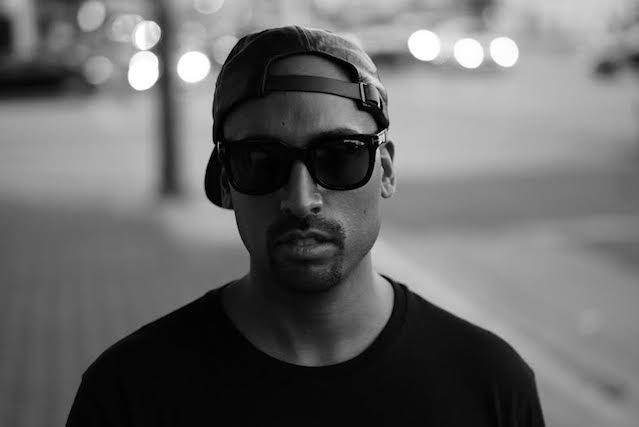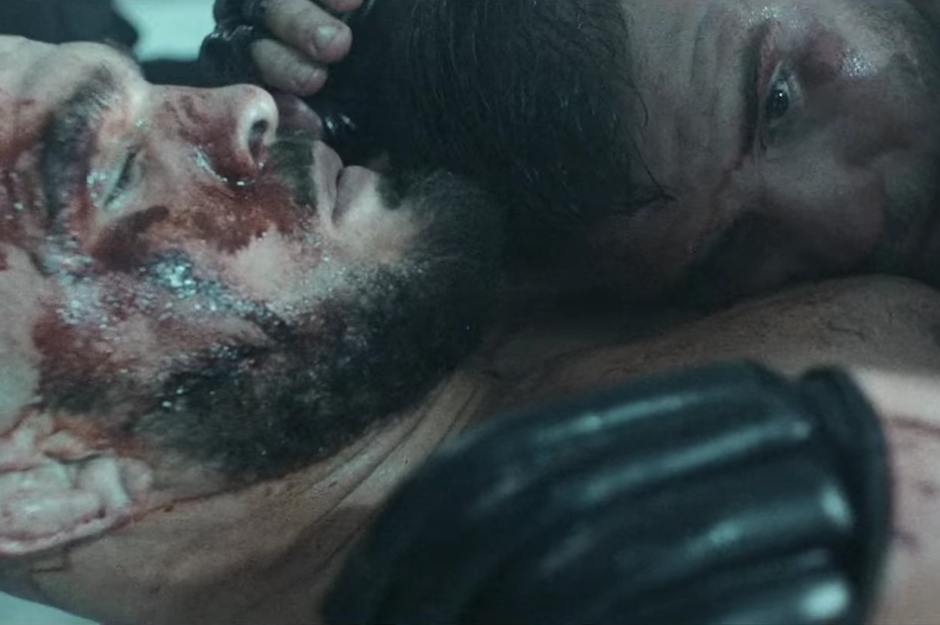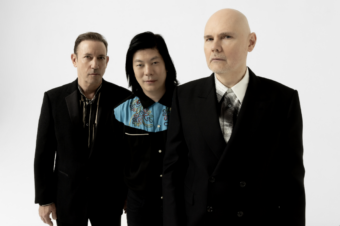In May of last year, Swedish beat collagist iSHi released a short black-and-white film with his mixtape Spring Pieces. The 13-minute clip’s surreal vignettes burst into the frame so vividly that it’s like waking up multiple times in the middle of the night, only to fall back asleep into a slightly altered version of the same dream. White wolves gallop alongside a black horse, a little boy runs down cement hallways, painted and chalked-up dancers writhe in straitjackets. Inspired by iconic ‘80s and late-‘90s magazine glossies of Puff Daddy and Kate Moss and Mike Tyson and Naomi Campbell, iSHi (born Eshraque Mughal) says Spring Pieces also owes its gestation to the icy fjords of his childhood.
“My mother and I used to go on these 24-hour cruises around Stockholm,” the 34-year-old tells SPIN in midtown Manhattan’s Mason Building, clad in all black except for white Common Projects sneakers. “I remember looking into the freezing, dark water and my heart pounding as a little kid — I was always terrified about drowning. That whole thing was the inspiration for the film: I’m bringing cold, black, Scandinavian water to hip-hop.”
ISHi became obsessed with both East and West Coast hip-hop (“I had the bandana and the thing in my nose, like Tupac,” he admits in a later phone conversation) through his older brother, who plastered his wall in Wu-Tang posters and sported “clothes that were three sizes too big.” Occasionally they’d physically fight each other about which music to play over the house sound system, which otherwise featured their parents’ old Stevie Wonder and Earth, Wind & Fire records. It was in this mixed musical environment that iSHi started laying the groundwork for his own studio-straddling, which follows a randomly far-ranging — yet somewhat prescribed — path.
Growing up, he couldn’t help but be exposed to the European techno and proto-EDM pumping through the Swedish airwaves, sounds which eventually became the hallmark of producers like Max Martin and trance titan E-Type. After he failed to get good grades in a required language-learning program because he was “s**t at Spanish,” young Eshraque was placed in a music school, where he learned to play drums because “everyone was into Nirvana” and “piano is for girls.” Once he fell in love with his first girlfriend at age 15, he begged a classmate to teach him how to play Boyz II Men’s “The End of the Road” for her, which led him down a velvet-lined rabbit hole toward Toni Braxton and Babyface.
These disparate threads pop out of Spring Pieces like an easy game of Name That Tune: the dubby reggae breaks in “Get My Money” jostle against the über-pop bomp of “Glow” before he pumps the brakes for soft-lit slow jam “Come Closer.” A bit schizophrenic? Sure, but the mixtape serves as iSHi’s C.V., illustrating his breadth behind the boards and foreshadowing his upcoming debut LP, which he says features go-to dance-music topliner Ella Eyre and undersung London powerhouse Emeli Sandé. “There are more proper songs — less rap,” he says of the album, due to be released sometime this year after being recorded mostly in Stockholm with a side jaunt to his mother’s vacation house in Zanzibar, Tanzania. “It was warm,” he says of the latter locale, laughing. “I’m not complaining.”
His process wasn’t always sunshine and beach roses, though. Much of the blueprint for iSHi’s album was actually made during a literally and figuratively dark two-and-a-half months he spent in Stockholm. Prior to that he had lived the dream in New York for a few years, doing things like meeting Raekwon at a club (and going in for a hug rather than shaking his extended hand) and trying to shop his pop songs around so they might wind up on the next albums by Britney Spears or Rihanna. Deep in debt with no chart-toppers to his name, Mughal returned home, where he found himself with nowhere to live, a “girlfriend situation,” and an hour-and-a-half drive to his studio every day. Nonetheless, during that period he produced “We Run” — which unites Raekwon’s crusty verses and shout-outs to guest French Montana’s Coke Boys crew over burnt brass notes — and the My Beautiful Dark Twisted Fantasy-esque “Push It” featuring Pusha T.
“I was frustrated when I made those songs, but it was made under no pressure,” he says of his unorthodox mix-and-match methods. “If you listen to ‘We Run,’ the original is six minutes long, with three rappers and a crazy long outro. It’s just the way I make music. French [Montana] and Wale and Raekwon, they say the same thing — it just sounds and feels so real.”
Additional reporting by Oliver Kinkel.





